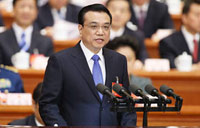Though Yu'ebao and its peers are labeled "blood-suckers" by some commentators, they have recently won government recognition. China won't ban web-based financial products like Yu'ebao, but will strengthen regulation to guide the healthy growth of Internet finance, authorities said.
By creating an alternative to state banks, these Internet innovations have been, in essence, prime movers in pushing interest rate reforms endorsed by China's financial authorities.
 |
 |
It is expected that new blood from the private capital will also invigorate the banking sector as these five private banks would be small or medium lenders, targeting small businesses that haven't been properly catered for.
NEW CHALLENGES
Tuesday's announcement does not come from nowhere. China has taken incremental steps toward interest rate liberalization, such as a move in July to scrap the floor limit for bank lending rates, and a guideline in December for piloting negotiable deposit certificates on the interbank market.
Still, these changes have been bold and intense enough to cause worries, and economic pundits have advised caution.
Ma Weihua, former president of China Merchants Bank, said interest rate liberalization contains big risks even though it is key to China's financial reform.
In the five years after the United States completed its interest rate liberalization, nearly 200 small and medium banks went bankrupt every year, Ma said, adding that Taiwan's banking sector was generally in the red following its interest rate liberalization.
Experts have also cautioned that the process, if not handled well, will not only hurt the banks but the real economy as well, citing expectations of a hike in deposit interest rates in the short term, which will likely be translated into higher lending rates by banks to minimize losses.
Though the private banks are billed as capable of spurring positive changes, their flexible operations are not risk-free either.
Shang Fulin, head of the China Banking Regulatory Commission, stressed that private banks would be subject to the same supervisory regime as existing commercial banks, with better monitoring of risk and shareholder behavior.
Lu Ting, an economist with Bank of America Merrill Lynch, proposed that the optimum sequence of reform is to liberalize interest rates for large amounts and long-term saving before turning to small amounts and short-term saving.
